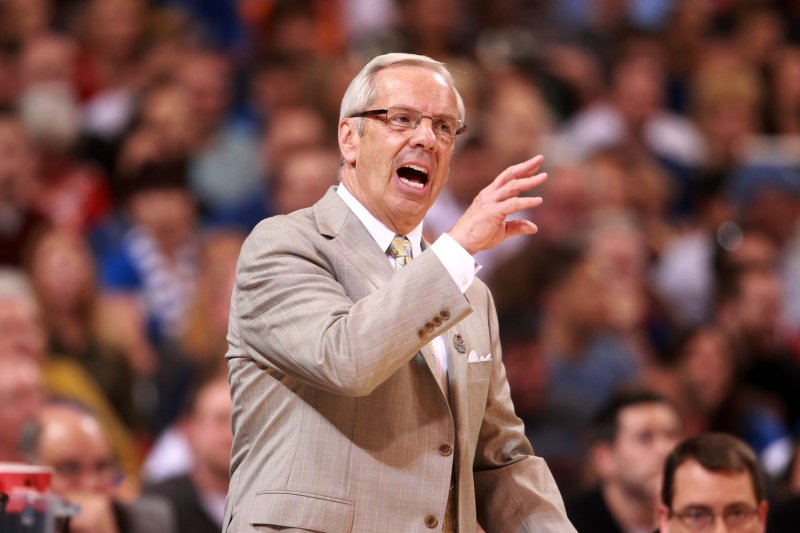North Carolina Head Coach Roy Williams gives instructions to his players during the first half against Kansas in the NCAA Basketball Midwest Regional Championship at the Edward Jones Dome in St. Louis on March 25, 2012. File photo by Bill Greenblatt/UPI |
License Photo
North Carolina's athletic department avoided major penalties when the NCAA Committee on Infractions was unable to conclude the university violated academic rules when it made "paper courses" available to the general student body, including student-athletics.
The practice went on from 1993 to 2011 -- the NCAA investigation was from 2002-11 -- and it involved a Department of African and Afro-American Studies course that required no attendance. Students would write a paper of at least 10 pages instead of having to attend lectures or interact with professors and there was evidence of grade changes and forged faculty signatures.
Yet the NCAA panel found just two violations -- a former department chair and a former curriculum secretary both failed to cooperate with its investigation.
"While student-athletes likely benefited from the so-called 'paper courses' offered by North Carolina, the information available in the record did not establish that the courses were solely created, offered and maintained as an orchestrated effort to benefit student-athletes," SEC commissioner Greg Sankey, the panel's chief hearing officer, said in the report released Friday. "The panel is troubled by the university's shifting positions about whether academic fraud occurred on its campus and the credibility of the Cadwalader report, which it distanced itself from after initially supporting the findings.
"However, NCAA policy is clear. The NCAA defers to its member schools to determine whether academic fraud occurred and, ultimately, the panel is bound to making decisions within the rules set by the membership."
North Carolina chancellor Carol Fort said the proper decision was reached in an open letter posted on the university's website.
"We believe this is the correct -- and fair -- outcome," Fort said. "I am grateful that this case has been decided and the university can continue to focus on delivering the best possible education to our students. We wish to thank the NCAA staff and the Committee on Infractions for their work and time during the joint investigation and hearing process.
"Carolina long ago publicly accepted responsibility for what happened in the past. One of the highest priorities of this administration has been to resolve this issue by following the facts, understanding what occurred, and taking every opportunity to make our university stronger. We have been open and transparent in everything we have done."
The report from the Committee on Infractions said its ability to determine whether academic fraud had occurred at the school was limited by an NCAA principle that relies on "individual member schools to determine whether academic fraud occurred on their own campuses."
North Carolina insisted the work was assigned, completed and graded under a professor's guidelines. The university admitted the courses failed to meet its own expectations and standards but maintained they didn't violate policies in place at that time.
The infractions panel also said there were no extra benefits provided to student-athletes because of what was cited in the 2014 Cadwalader report -- that just half the 3,100 students who took the paper courses were athletes.
"While student-athletes likely benefited from the courses, so did the general student body," Sankey said. "Additionally, the record did not establish that the university created and offered the courses as part of a systemic effort to benefit only student-athletes."
The NCAA began investigating the North Carolina football in 2010 for academic fraud during Butch Davis' tenure as coach. The program received a one-year ban, lost 15 scholarships and had to vacate 15 wins. The school launched its own investigation and found that the paper courses dated back to 1997.
A new investigation was launched in June of 2014 with a notice of allegations being issued in May of 2015. New information led to another notice of allegations being issued in December of 2016 that included charges against the men's basketball and football programs.
There were rumblings that the 2005 and 2009 men's basketball national championships could be vacated. Tar Heels coach Roy Williams insisted all along his program shouldn't be penalized and vindication arrived on Friday.
"We're certainly thankful the case has been decided and this great university can move forward," Williams said in a statement. "We appreciate the hard work and effort from so many people in presenting the facts of this the case to the Committee.
"I thank Chancellor Folt and (athletic director) Bubba (Cunningham) for their leadership. This is my alma mater and I love it deeply. We've all learned to be a better university from this case. Now we can focus completely on our mission of teaching and coaching our student-athletes and helping the university reached its dreams and goals."
The two people who refused to cooperate with the NCAA were former department chairman Julius Nyang'oro and retired secretary Deborah Crowder. Nyang'oro received a five-year show cause lasting until Oct. 12, 2022, while the NCAA is making a notation of Crowder's refusal to cooperate.















